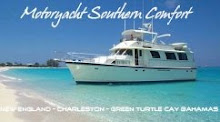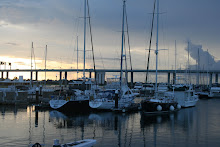The Post and Courier missed a pretty interesting story Tuesday but a search on the Internet turns up coverage from the Beaufort Gazette detailing the visit of the United States "Army" Vessel Robert Smalls.
Sitting on the 10,500-square-foot cargo deck of a massive Army transport vessel, more than 50 people remembered Beaufort's native son Tuesday morning and commemorated his daring escape out of the Charleston harbor almost 150 years ago.
The 314-foot, 5,412-ton USAV Maj. Gen. Robert Smalls came to port in Charleston on Monday afternoon, marking the ship's first trip to the Lowcountry since being commissioned in Baltimore in September. The $25 million support vessel is the Army's largest asset and the first Army vessel to be named after an African-American.
The ship, staffed by more than 30 soldiers, primarily is used to transport cargo and vehicles all over the world. The vessel can transport 19 A1 Abrams tanks or more than 100 shipping containers.
A ceremony Tuesday morning at the Port of Charleston's cruise ship passenger terminal commemorated the boat's return to Charleston harbor where, on May 13, 1862, Smalls famously commandeered a Confederate cotton steamer and piloted the boat to a Union blockade ship, freeing himself, his family and 12 other slaves onboard.
The ceremony, which included speeches from black leaders from across the state as well as local officials, was especially poignant for Kitt Haley Alexander, the founder of the Robert Smalls Legacy Foundation.
Alexander, an Alexandria, Va.-based writer and artist, has spent the last 12 years trying to get the military to name a ship after Smalls, following a chance encounter with his great-granddaughter, Janet "Dolly" Nash at a Savannah Black History Month event. Nash died from cancer in March 2004, just a month before the ship was christened.
It was Edward Miller's 1995 biography of Smalls, "Gullah Statesman," that prompted Alexander to petition the government incessantly for more than a decade to formally honor the Beaufort-born, slave-turned-Civil War Hero and five-term U.S. congressman, Alexander said.
"When I finished the book, I slapped it shut and said, 'This guy needs to be famous, somebody should do something.' Some months later, it occurred to me ... that I was the somebody," Alexander said. "Robert Smalls took over my life and the lesson that I take from him is that nothing ever stopped him, not even slavery. Given that, what could possibly stop me?"
The Rev. Kenneth Hodges, a member of the S.C. House of Representatives and pastor of Tabernacle Baptist Church, where Smalls was buried in 1915, said Smalls' meteoric rise should serve as an inspiration to all South Carolinians and all Americans.
"This was a man who was a slave on May 12, and three months later, we find that same former slave in Washington, D.C., with an audience with the President of the United States," he said.
Hodges said he has drafted legislation that will call for a statue honoring Smalls to be placed on the grounds of the Statehouse in Columbia, despite a state moratorium prohibiting any new statues on the grounds.
"That moratorium will be lifted and it is my hope that once it is lifted, one of the first monuments that will be added to the Statehouse grounds will be a monument honoring Robert Smalls," he said.
The vessel's first trip to the Lowcountry is not likely to be its last, said Chief Warrant Officer Steven Brown, vessel master of the USAV Maj. Gen. Robert Smalls.
"We're very humbled, the entire crew, to represent the Robert Smalls," he said. "The name, the history is incredible. The crew is very proud to carry that history into the future. When we pull into ports, it's very emotional to get on the radio and announce, 'This is the United States Army Vessel MG Robert Smalls.' That name is being projected out all over the world. This vessel will travel throughout the world."
Wednesday, June 25, 2008
Subscribe to:
Post Comments (Atom)




No comments:
Post a Comment